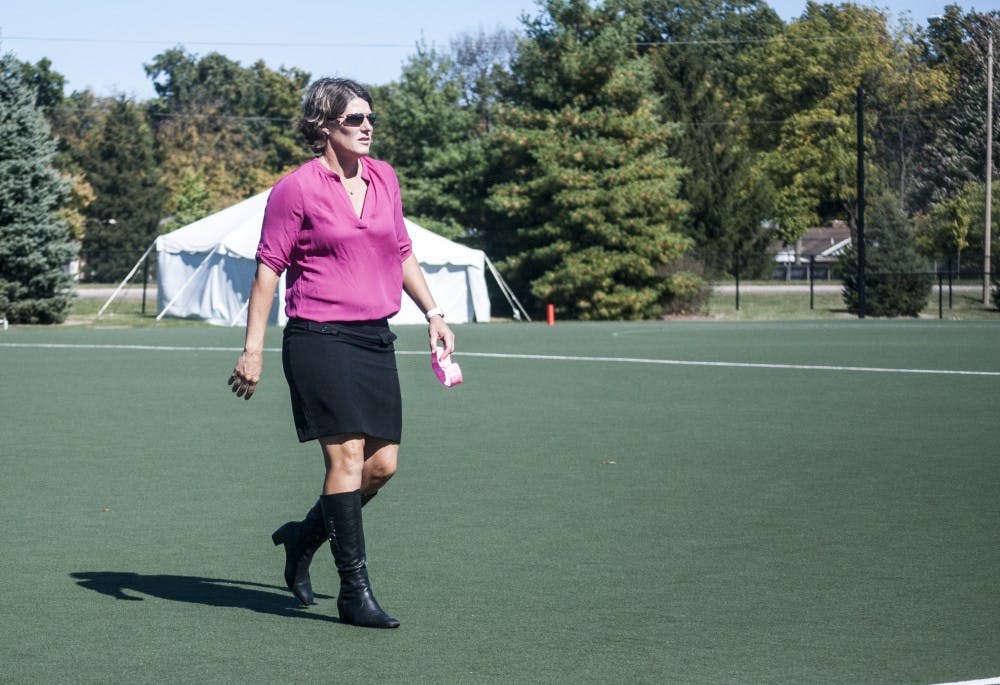During field hockey games and practices at the Briner Sports Complex, first-year head coach Sally Northcroft’s unique accent drowns out the dull roar of McGalliard Road. With heavy influences from her Zimbabwe origins and slight hints of her time in the United States and Australia, the Ball State alumna’s voice mirrors her path across the globe.
Language was one of many unexpected changes she experienced when she first arrived in the United States in 1996.
“There was a huge culture shock,” Northcroft said. “It’s funny, you speak the same language but then all the words are different.”
Northcroft spent the last decade coaching field hockey at Somerset College in Mudgeeraba, Australia, and then Brisbane Girls’ Grammar School in Brisbane, Australia.
She left the land down under in February 2015 to reignite a Cardinal field hockey program that has not had a winning record since 1999—Northcroft’s senior season.
That year, she set Mid-American Conference records with 52 goals and 107 points. During her career she had 126 career goals and 270 career points, all of which stand until this day.
She won the Honda Award as the nation’s top field hockey player and, for the second consecutive season, earned both MAC Player of the Year and All-American honors. She was first-team All-MAC in all four years of her Ball State career and still holds the NCAA Division I records for goals scored in a single game (7) and goals per game in a single season (2.74).
Northcroft came back to Muncie for the same reason she went to Australia, and the same reason she was so successful on the field.
“If you don’t take the shot, you’ll never score,” Northcroft said. “If you don’t make the move and see what it’s about and jump in 100 percent, you’re never gonna learn. You’re never gonna know and you’ll have regrets.”
GROWING UP IN WAR
Before all of the jobs, records and accolades, Northcroft was born just outside of Harare, Zimbabwe—then known as Salisbury, Rhodesia—in 1976. At the time, the then-British colony was involved in the Rhodesian Bush War.
Her father, Donald Northcroft, had retired from the Royal Rhodesian Air Force but the violence was inescapable. In 1977, when Sally was just one year old, her father was killed when Zimbabwean militants attacked his farm.
“It was a very tragic incident in how he was killed, and my mom was left to deal with two small kids,” Sally said. “We had to move from the farm into the city in a time when women were not given many jobs or provided with much financial assistance, so I guess my mom really filled the void for both parents and did absolutely everything she could to provide for my brother and I.”
Her mother did her best to provide them with a normal life, Sally said. They would visit her father’s family members during the holidays, watch black-and-white TV and, of course, travel to field hockey games.
But even after Zimbabwe was officially recognized as an independent country in 1980, the racial tension and violence remained.
“I grew up in a time when everybody had a rifle in their car and there was a lot of violence and very sad stories about people losing their lives,” Sally said. “Most of my childhood … you knew there was a difference between white and black and, unfortunately, the generation older than me grew up with a very strong racial discriminatory bent.”
More tragedy struck Sally as a teenager.
“When I was 16, my best friend was killed in a car accident, and I was supposed to be in the car with her,” she said. “It was New Year’s Eve, and all of the sudden I was dealing with the loss of a friend [and] I thought we were going to live forever, that sort of thing … You don’t know when things will change, and things will, and you’ve gotta be able to deal with it.”
Sally said her mindset of living in the moment developed through her losses and was influenced by her mother, who left her home of Durban, South Africa at age 18.
MOVING TO MUNCIE
When Sally decided to leave Zimbabwe to play for the Cardinals, her mom was supportive of her decision. One of the main reasons Ball State landed Northcroft's services was the first letter of its name.
“This is all before email, which makes me sound really old, but I don’t feel like it. So I had sent some letters to universities from an almanac,” Sally said. “I got to about the letter 'D' and I got bored, so Ball State was one of the schools I contacted.”
In retrospect, Sally was happy to have settled in Muncie. She said one of the best things that ever happened to her was being able to come to a place where she could to know people for who they were rather than their background or skin color.
Sally grew up without her father, but she had a mentor while at Ball State in field hockey coach Karen Fitzpatrick.
“I think Fitz was one of those people that you meet that are a one-in-a-lifetime kind of person,” Sally said. “She was absolutely pivotal in me becoming the player I was, and I needed structure and somebody that understood me. I needed somebody that could hold me accountable but could also see my potential and believed in me.”
As bright as Sally's star burned at Ball State, it paled in comparison to Fitzpatrick’s accomplishments. In her 21-year career, Fitzpatrick led Ball State to 16 Mid-American Conference regular-season titles and 10 tournament championships. She is also an 11-time MAC Coach of the Year.
Sally started off her coaching career as a Ball State assistant coach in Fitzpatrick’s final season, 2000. Fitzpatrick had high hopes for Sally from the beginning.
“I had hoped she would take over when I left, actually, but at that time, there were other things going on in her life,” Fitzpatrick said. “So when this happened, I was excited for her. I mean, she called and we talked for a long time about what the potential is for the program, and I was very excited to hear that she was even interested.”
Olympic dreams were one of the factors contributing to why Sally was apprehensive about coaching.
Zimbabwe was again in turmoil at the turn of the millennium, and before she attended Ball State, she almost had an opportunity to represent her home country.
“I missed out on a selection to the national team when I was 18, and my mom, in her wise words, said, ‘Well, you clearly weren’t good enough,’” Sally laughed. “Which, you know, if you’re good enough, no matter where you are, you’ll be picked on a team.”
Fitzpatrick said she believes Sally's personality and experiences will lend themselves well to coaching.
“I did work with Sally for a year as a coach, and she’s a great motivator,” Fitzpatrick said. “She has high expectations, and that’s why I feel like she’ll be successful as a coach. She understands the game, she understands the competitiveness that’s involved to be successful. She’s a good technical player as well. Those are all things that I think contribute to successful coaching.”
Sally eventually left the United States in 2004 to coach field hockey at Somerset in Australia.
LIFE OF A COACH
Although Sally continued to move forward, her past shaped her path, said Michael Brohier, deputy headmaster of Somerset College.
“If you’ve been in a country where you’ve seen hardship, you come to a place like America or Australia, and you tend to appreciate what you have a lot more," Brohier said.
Sally may have inherited her mother’s directness when she spoke. Brohier said he appreciated that quality when he worked with her at Somerset.
“She was very straight-talking,” he said. “If she had something to tell you, she usually told you that. That brought her up in conflict with certain people, but I’d much rather work with a person like that, who is open and who speaks her mind.”
Along with coaching, she was a head of house. One of her duties included counseling, and Brohier said her unique life experiences made her well suited for the role.
“She related well to all students, but she related particularly well to students who could potentially go off the rails,” Brohier said. “She had sort of been there, done that. She could talk from experience, and I suppose she was really relevant and she commanded a lot of respect. I mean, they liked her, but she commanded a lot of respect.”
In 2011, Sally moved to Brisbane where she was named director of sport and field hockey coach of Brisbane Girls’ Grammar School.
That same year, her father’s high school—Prince Edward School in Harare, Zimbabwe—held a 50th-year reunion for her father’s undefeated rugby team, and the returning members presented the school with a trophy in Donald Northcroft’s name. Sally said she returned to Zimbabwe for the event and got a glimpse of her father through his teammates.
“The thing that struck me was that every single person couldn’t say anything that wasn’t just absolute adoration for my father,” she said. “I mean, I’m sure he’s human and made a few people cranky, but I’ve always grown up with the idea that he was a pretty special guy, so I try to live up to that in some way.”
Although loss and tragedy dot her personal history, Sally said she still enjoyed growing up in Zimbabwe. She said it was charming in some ways, and they could do a lot more than people probably think can be done in Africa.
Still, it was loss and tragedy that led Sally to travel around the globe, trading the beaches of Australia for a patch of turf next to McGalliard Road.
“That was the message and resilience in terms of this is what you’ve got, you’ve gotta make the most of it,” she said. “You don’t know when it’s gonna change, you don’t know how quickly it can change or what could happen, so when it’s in front of you, take it with both hands and make the absolute most of it. Don’t hold back for a second.”





